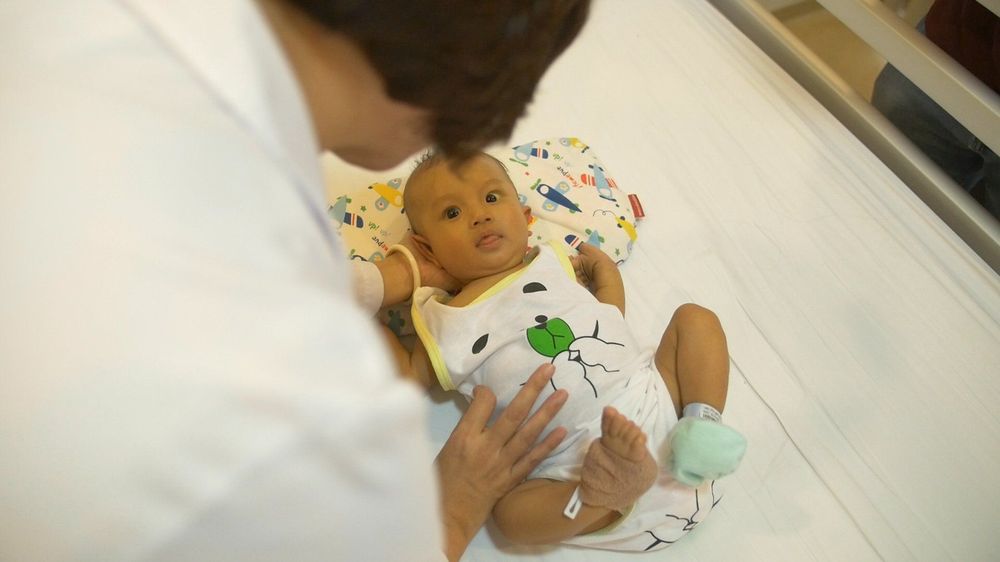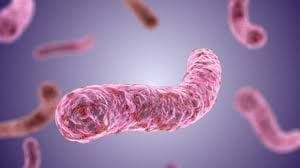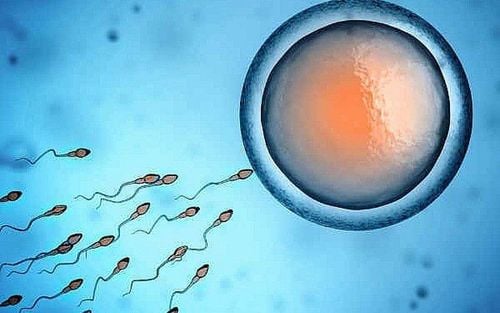This article is guided by Master Dr. Mai Kieu Anh from the Pediatric Center at Vinmec Times City International General Hospital.
Coughing and vomiting are common issues faced by newborns and infants. If you are caring for a young child, it's essential to understand the fundamental aspects of these symptoms.
1. Coughing and vomiting: Signs of Potential Illness
Coughing and vomiting are frequently observed symptoms in young children, particularly in those under one year old. These symptoms can be either physiological or pathological. Therefore, it's important for mothers to distinguish between the two and to know when to seek medical attention.

Coughing is a protective reflex that occurs when the airway is obstructed by foreign objects or excess secretions. This reflex helps clear the airways and improve respiratory function. However, if a child is coughing excessively to the point that it disrupts their play or sleep or is accompanied by fever, wheezing or rapid or difficult breathing, mothers should consult a medical professional. Common illnesses that may lead to coughing include pharyngitis, bronchitis, bronchopneumonia, etc.
Vomiting is also prevalent among young children and refers to the forceful expulsion of stomach contents. Causes may include overeating, sudden position changes, or incorrect feeding practices. In these instances, regurgitation is not necessarily a medical issue
However, vomiting can also indicate underlying health issues such as gastrointestinal disorders (gastroesophageal reflux disease, digestive disturbances, intestinal obstruction, enteritis), neurological conditions (meningitis, encephalitis), or respiratory tract infections (nasopharyngitis, pneumonia, bronchitis).
Warning Signs: Mothers should take seriously the following symptoms: vomiting everything the child eats, poor weight gain, lack of appetite, persistent crying, fever, fatigue, and diarrhea. These are indicators that require immediate medical consultation.
Quiz: What are the appropriate milestones for a baby's mental and motor development?
When should a baby start talking, listening to conversations, or holding a cup? Test your knowledge on standard development milestones for your little one!
Trắc nghiệm: Sự phát triển tinh thần, vận động của bé thế nào là đúng chuẩn?
Khi nào bé biết nói, biết hóng chuyện hay biết cầm cốc là "đúng chuẩn"? Điểm xem bạn biết được bao nhiêu mốc phát triển tinh thần, vận động "đúng chuẩn" của bé nhé!The following content is prepared under supervision of Thạc sĩ, Bác sĩ y khoa, Ma Văn Thấm , Nhi , Phòng khám Đa khoa Vinmec Dương Đông(Phú Quốc)
The content of this test has been prepared with guidance from Master Dr. Ma Van Tham, a pediatrician at Vinmec Duong Dong International Clinic (Phu Quoc)
2. Causes of Coughing, Spitting up, and Vomiting in Children
Respiratory conditions such as nasopharyngitis, bronchitis, bronchopneumonia, bronchiolitis, and bronchial asthma are leading causes of coughing in young children. These illnesses are typically caused by viruses, followed by bacteria and other pathogens. Young children are more prone to these infections, as their immune systems are still developing, which can lead to more severe and prolonged illness compared to older children.

Digestive disorders, including gastroesophageal reflux, digestive disturbances, enteritis, and intestinal obstruction, are common reasons for vomiting in young children.
Mistakes in feeding can also contribute to these problems. For example, overfeeding, forcing children to eat, or improper breastfeeding techniques can lead to vomiting. To reduce post-meal spitting up, mothers should hold the baby in a semi-upright position and gently pat their back to encourage burping after meals. It’s crucial not to lay the baby down immediately after feeding.
Other rare diseases: Meningitis, encephalitis, sepsis... These are very rare causes, but if they occur, they are often very serious and dangerous. Therefore, if a child has a cough or vomiting accompanied by high fever, convulsions, lethargy, difficulty waking up, etc., mothers need to take the child to a medical facility as soon as possible for timely treatment
3. Instructions for Caring for Children with Cough, Spitting up, and Vomiting
- Keep Children Warm
Mothers should ensure that their children are dressed warmly, especially when they are coughing. Avoid setting the thermostat too low, particularly at night and in the early morning. During winter, use a scarf to keep the baby’s respiratory tract warm. When going outdoors, make sure to dress the child warmly and have them wear a mask.
- Improve Children's Health
Feeding children a variety of nutritious foods helps them develop a strong immune system capable of combating pathogens. During illness, encourage them to drink plenty of fluids, especially fruit juice, to provide essential vitamins and hydration.
- Divide Meals into Smaller Portions
Young children, especially newborns, often spit up and vomit because of their small stomachs, the horizontal position of their stomachs, and a weak lower esophageal sphincter. To reduce spitting up and spitting up and vomiting, mothers should divide meals into smaller portions throughout the day. Choose foods that are easy to digest and ensure that the texture of the food is appropriate for the child's developmental stage.
- Modify the Diet
Many mothers mistakenly feed their children in ways that can be harmful. Mothers need to make changes to help children have a healthy digestive system and minimize symptoms of spitting up and vomiting. Do not require children to eat large amounts, and do not lay them down immediately after feeding. Also, the consistency of the food should be appropriate for the child's age; it should neither be too thick nor too thin.
4. Monitor When Your Baby is Spitting up and Vomiting

When a baby is vomiting, mothers should position them with their heads tilted forward or lying on their side to prevent food from entering the trachea. Do not pick up or lift a child while vomiting, as the vomited fluid may spill into the airways, causing difficulty breathing and critical respiratory failure for the child.
If a child vomits, they lose fluids that must be replaced. Offer small amounts of oral rehydration solutions, filtered water, or diluted fruit juice. Make sure the baby takes small sips instead of using a bottle, and discourage fast drinking.
Expert Advice:
- If your baby coughs and vomits excessively, or if there are any unusual signs, consult a doctor for advice and examination. Vaccination can prevent many common respiratory and digestive diseases, so it's beneficial for mothers to seek guidance on how to protect their children.
- Coughing, spitting up, and vomiting are common symptoms in young children that require special attention. The early stages of life are crucial for a child's development, and their immune systems are not yet fully matured, making them susceptible to various illnesses. If symptoms like coughing, runny nose, or excessive vomiting occur, parents should consider taking the child to Vinmec for an early evaluation and treatment to prevent complications.
For children to thrive, they require a balanced and nutritious diet. Without adequate and well-rounded nutrients, children may face health issues resulting from either excess or deficiency of certain nutrients. These imbalances can negatively impact the child's overall development, affecting them physically, mentally, and motorically.
Children who do not eat properly are at risk of lacking essential microminerals, which can lead to issues such as anorexia, slow growth, and malabsorption. If parents notice these signs, they should consider supplementing their children's diets with products designed to support growth. These supplements typically contain lysine, essential minerals, and vitamins, such as zinc, chromium, selenium, and B vitamins, to help meet children's nutritional needs. Additionally, these essential vitamins support digestion, enhance nutrient absorption, improve anorexia, and encourage healthy eating habits in children.
For more information on caring for your baby and family, please regularly visit Vinmec.com















